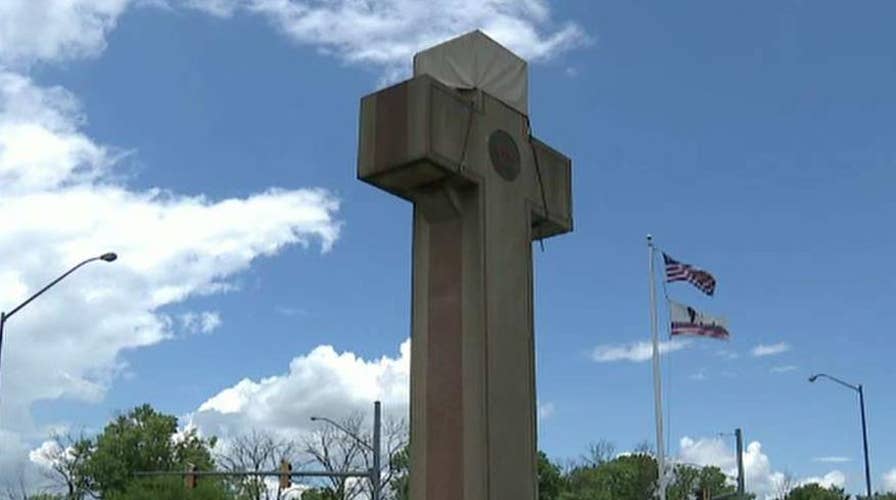Supreme Court rules 7-2 in favor of allowing Maryland 'peace cross' to stay on public land
Hiram Sasser and Kevin Bartlett say that the Supreme Court ruling will allow many veteran memorials to stay standing.
The end of the Supreme Court’s recent term marks the beginning of a new era for religious liberty in America.
With a landmark 7-2 decision in the case of The American Legion v. The American Humanist Association – combined with the decision by the court in Klein v. Oregon Bureau of Labor and Industries – we are on the cusp of experiencing a return to our nation’s founders’ vision of freedom I did not expect to see in my lifetime.
For the past 30 years, I have dedicated my career to defending religious liberty. In these two cases, my firm, First Liberty Institute, represented The American Legion and Aaron and Melissa Klein.
KELLY SHACKELFORD: SUPREME COURT PEACE CROSS DECISION IS A MAJOR VICTORY FOR RELIGIOUS FREEDOM
Our argument to the court on behalf of The American Legion was not only to defend the constitutionality of the Bladensburg World War I Veterans Memorial in Maryland, but also to finally put an end to the disastrous “Lemon test.”
The Lemon test, drawn from the Supreme Court’s 1971 decision in Lemon v. Kurtzman, has for decades created confusion in the establishment clause analysis and led to unnecessary government hostility to religion.
The late Supreme Court Justice Antonin Scalia said of the test: “Like some ghoul in a late night horror movie that repeatedly sits up in its grave and shuffles abroad, after being repeatedly killed and buried, Lemon stalks our Establishment Clause jurisprudence….”
The majority opinion in the American Legion case made it clear that Lemon will no longer be applied in cases involving monuments, memorials, or religious imagery or practice in the public square. Taken together with the concurring opinions it is hard to find any circumstances under which courts would seek to apply Lemon.
Furthermore, merely being an “offended observer” is now extremely shaky ground to base a lawsuit. Roving bands of the perpetually offended may soon see their litany of litigation met with dismissals for lack of standing.
This return to the text and intent of the establishment clause of the First Amendment will bring clarity to the court’s jurisprudence in this area of the law that Justice Clarence Thomas has noted “is in hopeless disarray.”
This is also the case with our petition to the Supreme Court on behalf of Melissa and Aaron Klein, the former owners of Sweetcakes by Melissa in Oregon. We sought justice for the Kleins, whose family business was bankrupted by a $135,000 penalty from the state of Oregon for not custom-designing a wedding cake for a ceremony that conflicted with their deeply held religious convictions.
We also urged the Supreme Court to reassess Employment Division v. Smith. What Lemon was to the establishment clause, Smith is to the free exercise clause, yet possibly worse. The ruling in Smith has left the free exercise clause virtually dormant for decades.
The Supreme Court vacated the decision by the Oregon Court of Appeals and ordered that court to hear the Klein case again, applying the Supreme Court’s Masterpiece Cakeshop decision. The high court is sending an unmistakable message that government hostility to the religious beliefs of its citizens will not be tolerated.
This could lead to the ultimate victory for Aaron and Melissa Klein, but if the Oregon Court of Appeals reaches the same conclusion it previously held against the Kleins – even in light of the Masterpiece Cakeshop decision – the Supreme Court may have another opportunity to review Employment Division v. Smith.
Overturning Smith and restoring the strict scrutiny of government actions that impede the free exercise of religion would properly shift the legal burden back to the government. Government would be required again to prove its actions impeding the free exercise of religion are absolutely necessary and the least restrictive means on the religious freedom of the citizenry.
CLICK HERE TO GET THE FOX NEWS APP
I can honestly say that when I began defending religious liberty 30 years ago I never expected to see a day without the specter of the Lemon test or the constitutional contortions required to fit free exercise claims into free speech jurisprudence to avoid the pitfalls of Smith.
The mere possibility that in the very near future we could be living free of both fills me with more hope for the future of our nation than I’ve held at any time in my life. The full religious freedom put into place by our founders may soon be restored in America once again.









































